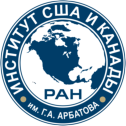
On April 9-10, 2019, the Russian-American conference on arms control was organized by the Institute of the USA and Canada of the Russian Academy of Sciences with the support of the Public Diplomacy Fund named after A.M. Gorchakov and the Russian Peace Fund. The conference was co-chaired by Academician Sergei Mikhailov of the Russian Academy of Sciences, Russian Academy of Sciences USA and Canada Russian Academy of Sciences, and Thomas Pickering, former First Deputy Secretary of State, and former US Ambassador to the United Nations and the Russian Federation, from the United States.
The conference agenda included a discussion of three issues:
Limitation of damage caused by the cancellation of the INF Treaty;
Consequences of the termination of the INF Treaty for START-3;
Implications for the 2020 NPT Review Conference
On the Russian side, the conference was attended by more than 30 leading experts on arms control, foreign policy and military issues, including: Executive Director of the Public Diplomacy Support Fund named after A.M. Gorchakova, Extraordinary and Plenipotentiary Ambassador Drachevsky L.V .; Corresponding Member of the Russian Academy of Sciences Voytolovsky F.G., Director of the E. Primakov Institute of World Economy and International Relations of the Russian Academy of Sciences (IMEMO RAS); Corresponding Member of the Russian Academy of Sciences A. Gromyko, Director of the Institute of Europe, Russian Academy of Sciences; Academician of the RAS V. G. Baranovsky, Member of the Management Board of IMEMO RAS; Retired Colonel General Yesin V. I., Leading Researcher, ISCRAN; retired Major General P. Zolotarev, ISCRAN Leading Researcher; Retired Vice-Admiral V. Kuznetsov, ISRCAN Senior Researcher; Oznobishchev SK, Head of the Military-Political Analysis and Research Projects Section, IMEMO RAS; retired lieutenant general E.P. Buzhinsky, chairman of the PIR Center Council; Dyakov A. S. Chief Researcher (formerly Director) of the Center for the Study of Disarmament, Energy and Ecology; Mizin V.I., Leading Researcher, Center for Post-Soviet Studies, MGIMO-University; Khlopkov A.V., director of the Center for Energy and Security, editor-in-chief of the journal ‘Nuclear Club’; Trenin D.V., Director of the Carnegie Moscow Center, etc.
On the American side, Frank Rose, a senior fellow at the Brookings Institution’s foreign policy program and former Under Secretary of State for Arms Control, attended the conference; Stephen Rademaker – Former Under Secretary of State for Arms Control; Robert Einhorn – Senior Fellow, Arms Control and Nonproliferation Initiative, Brookings Institution, former US Under Secretary of State for Nuclear Non-Proliferation; Daryl Kimbel – Executive Director of the Arms Control Association; Alexandra Bell, Senior Policy Director, Arms Control and Non-Proliferation Center; Former Senior Advisor to the Under Secretary of State for Arms Control and International Security; Thomas Blanton, President, National Security Archive; Amy Wulf – Research Associate, US Congressional Research Services; John Wolfsthal – Senior Advisor to the Global Zero Public Organization, Former Assistant to the President of the United States for Disarmament Affairs and Senior Director of Arms Control and Non-Proliferation of the US National Security Council Rita Gunter – Senior Program Officer, US National Academy of Sciences; Olga Oliker – Program Director for Europe and Asia of the International Crisis Group; Svetlana Savranskaya – Senior Analyst, National Security Archive; Carl Robisho is Carnegie Corporation International Peace and Security Program Officer.
The meeting was attended by Deputy Minister of Foreign Affairs of the Russian Federation S. Ryabkov The chairman of the State Duma Committee on Foreign Affairs L. Slutsky also spoke at the conference.
Following the conference, the participants approved a joint statement.
Statement by the Russian-American Arms Control Conference
Moscow, April 9-10, 2019
We, Russian and American experts on national security issues, are deeply concerned about the deterioration of international security, the prospect of increased rivalry between the leading world powers in the strategic sphere and the increased risk of military confrontation that could lead to the use of nuclear weapons. We call on the governments of the two countries to express their commitment to countering these alarming trends and strengthening strategic stability, including:
- Confirmation of the Reagan-Gorbachev statement that a nuclear war cannot be defeated and it cannot be started;
- Extension of START-3 until 2026, as provided for in Article XIV of the Treaty or negotiations;
- Recognition of the need to avoid a new arms race as a result of the likely termination of the INF Treaty;
- Conducting regular high-level negotiations on such factors affecting strategic stability and


© Photo courtesy of the Public Diplomacy Support Fund A.M. Gorchakova
